

Matt Taibbi: "Is the SEC Covering Up Wall Street Crimes?" (Democracy Now! Interview) Who came up with the model for excessive pay? No, it wasn't the bankers – it was academics. Take a big step back.
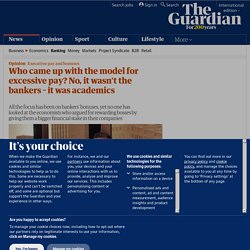
Ignore those sterile debates about how Dave screwed up over Stephen Hester's pay and where this leaves Ed. Instead, ask this: which profession has done most to justify the millions handed over to the boss of RBS, his colleagues and counterparts? Which group has been most influential in making the argument that top people deserve top pay? Not the executives themselves – at least, not directly. Nor the headhunters. The ground rules for the system by which City bankers, Westminster MPs and ordinary taxpayers live today were set by two US economists just a couple of decades ago.
The way to get better performance out of bosses, argued the economists, was by giving them a bigger financial stake in their company's performance. The usual criticism of economists is that they missed the crisis: they preferred their models to reality, and those models took no account of the mischief that could be caused by bankers running wild. Maybe, but it also pays to be deluded. Old mortgages rise from the dead, haunt homeowners. How banks get away with inventing profits.
Both sides of the political divide are in agreement that bailing out the UK's failed banks in 2008 (and Northern Rock in 2007) was the right decision.
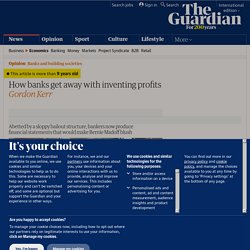
Taxpayers were told that the worst of all possible worlds would have occurred had banks been allowed to fail. By bailing them out, and by encouraging them to continue to reward executives on pre-crisis pay scales and incentives, politicians prophesied that things would be fine, and management were incentivised to hope that things were fine. The cream of banking talent would remain at the helm of each bank, steadying the ship, ensuring that liquidity would flow through the national economy, which would soon be back on its feet.
Going Rogue: Share Traders More Reckless Than Psychopaths, Study Shows - SPIEGEL ONLINE - News - International. Two weeks ago, yet another case of rogue trading shocked the financial world when UBS trader Kweku Adoboli was arrested for allegedly squandering some $2.3 billion with a risky and unauthorized investment scheme.
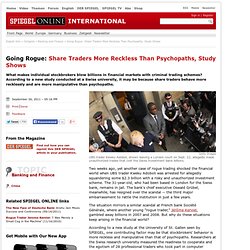
The 31-year-old, who had been based in London for the Swiss bank, remains in jail. The bank's chief executive Oswald Grübel, meanwhile, has resigned over the scandal -- the third major embarrassment to rattle the institution in just a few years. The situation mirrors a similar scandal at French bank Société Générale, where another young "rogue trader," Jérôme Kerviel, gambled away billions in 2007 and 2008. A la Socgen, le trader qui en disait trop.
Banques américaines : l’étau se resserre sur les fraudes. City's influence over Conservatives laid bare by research into donations. The influence of the City over the Conservatives has been laid bare by new research showing that more than half of the Tory party's donations since the general election have come from individuals and businesses working in finance.
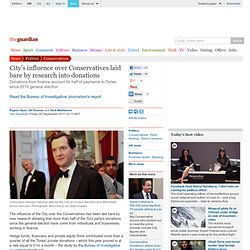
Hedge funds, financiers and private equity firms contributed more than a quarter of all the Tories' private donations – which this year poured in at a rate equal to £1m a month – the study by the Bureau of Investigative Journalism has found. The figures show an increase in the proportion of party funds coming from the financial sector, raising fears that the City's financial influence over the Tories is on the rise as key pieces of legislation are discussed by the coalition government.
Big Bank Chart. Les détails de la plainte des Etats Unis contre 17 banques dont la Société Générale. Your Guide To The MASSIVE FHFA Bank Lawsuits. Here It Is: Presenting Goldman's "The World Is Ending So Let's All Profit" Report. Schwab sues banks for manipulating Libor rates. Eight Schwab mutual funds and related entities are the latest plaintiffs to sue a number of global banking institutions over alleged manipulation of the London interbank offered rate. In a suit filed August 23 in U.S. district court in San Francisco, the funds allege that from the beginning of 2007 through about March of this year the banks' manipulation of Libor allowed them to pay lower interest rates on short-term paper that the funds purchased from the banks as well as from other entities.
About a dozen similar suits have reportedly been filed by investment funds in recent months as global regulators have launched investigations into the alleged rate manipulation. The banks “reaped hundreds of millions, if not billions, of dollars in ill-gotten gains,” Schwab said in its claim. The Schwab suit seeks unspecified damages, which may be tripled under antitrust law. Bonnet d’âne pour le FMI, par Pierre Rimbert. Warren Buffet investit 5 milliards dans Bank of America. Bank of America, actuellement confrontée à une crise de confiance à Wall Street, a reçu jeudi le soutien du milliardaire américain et icône des marchés boursiers Warren Buffett, qui va investir cinq milliards de dollars dans l'établissement.
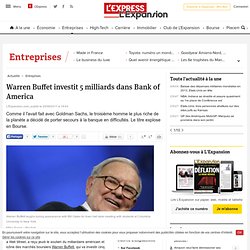
Nick Leeson. Leeson's legacy lives on in Singapore. Ten years ago this week, the rogue trader Nick Leeson fled Singapore after realising he could no longer hide his trading losses of more than $1bn.
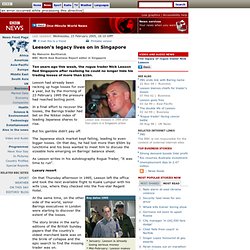
Leeson had already been racking up huge losses for over a year, but by the morning of 23 February 1995 the pressure had reached boiling point. In a final effort to recover the losses, the Barings trader had bet on the Nikkei index of leading Japanese shares to rise. Inside Story - Jerome Kerviel: Villain or victim? High-Frequency Firms Triple Trades in Rout. The stock market’s fastest electronic firms boosted trading threefold during the rout that erased $2.2 trillion from U.S. equity values, stepping up strategies that profit from volatility, according to one of their biggest brokers.
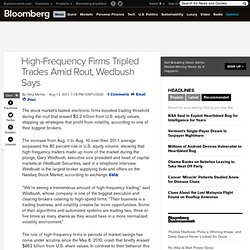
The increase from Aug. 1 to Aug. 10 over their 2011 average surpassed the 80 percent rise in U.S. equity volume, showing that high-frequency traders made up more of the market during the plunge, Gary Wedbush, executive vice president and head of capital markets at Wedbush Securities, said in a telephone interview. Wedbush is the largest broker supplying bids and offers on the Nasdaq Stock Market, according to exchange data. “We’re seeing a tremendous amount of high-frequency trading,” said Wedbush, whose company is one of the biggest execution and clearing brokers catering to high-speed firms. “Their business is a trading business, and volatility creates far more opportunities. Rising Volume. Federal Reserve Directors: A Study of Corporate and Banking Influence. Staff Report,Committee on Banking,Currency and Housing, House of Representatives, 94th Congress, 2nd Session, August 1976. The World's Biggest Central Bank Has Private Shareholders. 11 La double arnaque. Le mot clef est : crédibilité.
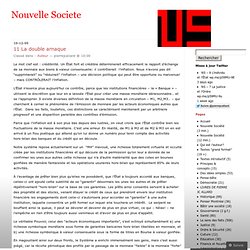
Un État fort et crédible déterminerait efficacement le rapport d’échange de sa monnaie aux biens à valeur consensuelle: il contrôlerait l’inflation. Nous n’avons pas dit “supprimerait” ou “réduirait” l’inflation – une décision politique qui peut être opportune ou malvenue! Les banques détournent l’argent du livret A. Quand les cours boursiers sont ouvertement manipulés. On appelle ça « l’arrachage des cours ». C’est-à-dire qu’à un moment donné, généralement en fin de séance (car ce sont les chiffres de fin de séance que retient l’opinion), les cours en bourse font soudain un bond de plusieurs dizaines de points sans que rien, absolument rien dans la conjoncture ne justifie ce sursaut spectaculaire.
Le très respectable Cercle Finance s’en émeut et en donne une illustration symptomatique avec ce qui se passa le 31 mai 2011 à Wall Street. Dans la demi-heure précédant la clôture, notre Dow Jones s’envola de 63 points, permettant une hausse confortable de l’indice journalier. Pendant la crise, une banque US sauvée par l'argent de la drogue. La finance, facteur d'inégalités. La montée des inégalités aux États-Unis est désormais presque un fait de connaissance commune [1].

Ce phénomène ne se limite plus à ce seul pays, mais est bien plus général et international [2]. Les travaux de Camille Landais montrent qu’en France, les inégalités ont aussi recommencé à augmenter, à un rythme soutenu, mais ceci seulement depuis la fin des années 1990 [3]. La description analytique et l’interprétation de cette évolution ne font que commencer. Un facteur, largement commenté, est la hausse considérable des rémunérations des PDG au cours des trente dernières années [4]. Campaign via social media networks blocks Dutch bankers' bonuses. Britain has a rival when it comes to bashing bankers.
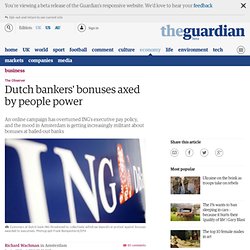
Too Big To Fail. Fannie, Freddie et les bonnes intentions. Do We Need Big Banks? Yves here. I normally let VoxEU articles stand on their own, but this topic, of whether the bank PR that bigger banks are essential stands up to scrutiny, is near and dear to my heart. Ted Kaufman's Friday Hearing Explains Everything That Is Broken With The US Financial System.
Et si on fermait la Bourse..., par Frédéric Lordon. Frédéric Lordon : «il faut fermer la Bourse!» Observatoire des inégalités. Spéculation. Regulation & taxation. Goldman Now 3 Out Of 5 In World Monetary Domination: Goldmanite To Replace Andrew Sentance At Bank Of England. Le pouvoir de Wall Street. Recensé : Simon Johnson et James Kwak, 13 Bankers. The Wall Street Takeover and the Next Financial Meltdown, New-York, Pantheon, 2010, 304 p., 21 euros (en version poche, Vintage Books Edition, 2011, 316 p., avec un nouvel épilogue traitant en particulier de la loi Dodd-Frank) En septembre 2008, Simon Johnson assiste à la chute de Lehman Brothers alors qu’il vient d’achever son mandat en tant qu’économiste en chef du Fonds Monétaire International.
Ce professeur à la Business School du Massachusetts Institute of Technology décide alors de créer un blog pour commenter l’actualité financière et contribuer au débat sur la politique économique et la régulation bancaire. Il s’associe pour cela à James Kwak, fin connaisseur des nouvelles technologies ayant un talent pour déchiffrer et vulgariser les concepts financiers qui sont alors au cœur du débat [1].
The Baseline Scenario se veut un blog simple, sans images tape-à-l’œil, avec des articles argumentés, documentés, et accessibles à tous. François Pérol, ex-conseiller de Sarkozy, pilote du lobby bancaire. A Secretive Banking Elite Rules Trading in Derivatives. This Goldman Partner Told Her Subordinates To Package And Hide The Crap They Couldn't Sell In CDOs. The Rising Power of Financial Blog Zero Hedge - Money 2009. Here Comes Executive Order 6102 For The QE Generation: Dutch Central Bank Orders Pension Fund To Sell Its Gold.
Why Isn't Wall Street in Jail? 24 Mars 2006 : M3 n’est plus publié par la Réserve fédérale US. UK's £80 Billion Pension Blunder? Primary dealer. Discontinuance of M3. Livret A: 30 milliards pour les banques, qui en redemandent. Garantie des dépôts bancaires. Fonds de garantie des dépôts. Les banques britanniques sauvegardent leurs bonus en promettant de prêter davantage. Banques : des comptes courants qui polluent plus que les 4×4 » Article » OWNI, Digital Journalism. Les crédits carbone: nouveau joujou toxique de la finance » Article » OWNI, Digital Journalism. Fausses notes : Le blog de Stéphane Montabert.